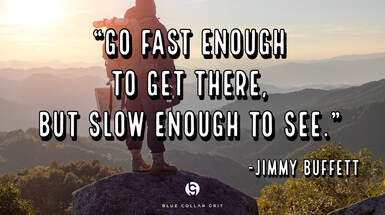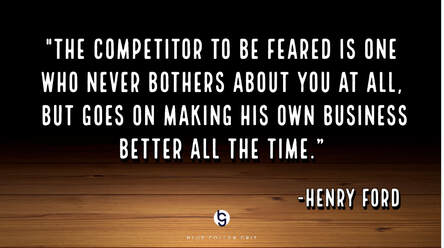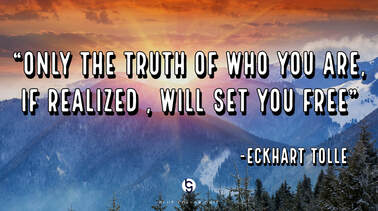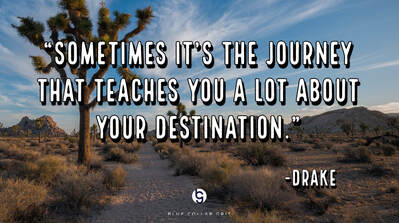Our PaceOne of the key marks of a great basketball player is the pace he plays at. The best players aren’t always fast or always slow. They have the ability to vary their pace from game to game, possession to possession, or even dribble to dribble.
Their pace itself isn’t as important as their awareness of the pace. Given awareness, they can choose what’s best for each situation. Void of awareness, they simply become a reflection of their current environment. The same can be said for our lives. Why Should We Care? What pace do you live your life at? It’s a question most have never considered. We just live. Going from one thing to the next without considering the effect of the pace of our lives on ourselves and those around us. But, it has an impact - often a significant one that we would benefit from gaining an awareness of. The first group is the sprinters. The sprinters are going full speed in whatever direction they are pointed. They could be hell bent on doing and experiencing as many things as possible in the one life they have - YOLO, for those of you of the right age. But, this group isn’t limited to reckless risk takers. There are also sprinters consumed with achievement, climbing the ladder, and collecting as much as they can. This group is usually successful by society’s standards and is consumed with ‘earning’ their worth. Enough isn’t a thing and fulfillment is always on just the other side of the next accomplishment. The second group are meanderers. The meanderers are never going full speed. Their direction is irrelevant because of how futile any effort is. They typically cover a wide spectrum of emotion, from appearing to be happy and content to signs of being adrift and resentful. Meanderers are viewed by sprinters as lazy, uninspired, and underachievers. Society typically agrees and supports this perspective. Hence, the pride and glory so many associate with working long hours at the expense of spending ‘down’ time with family or loved ones. The good news is, we don’t have to operate solely in either group. Life is best when lived between the two extremes. There are, indeed, seasons to life. Slow and chill all the time leaves us feeling no sense of contribution or fulfillment. Spending every waking moment striving for more leaves us exhausted and, oddly enough, unfulfilled. Similar to a great basketball player, we are best when we change our pace. REAL TALK - Action Steps Awareness is difficult to acquire. Recognizing the pace we have and the pace we need are critical. Here are a few ideas to help become more aware of our pace.
Contrary to what we hear, excellence thrives when balance is achieved. Understanding the pace we are living and intentionally choosing to adjust it as we see fit, is the essence of excellence in life and leadership. For more information on building excellence in your teams, visit us at www.bluecollargrit.com. We would love to know how we could help!
1 Comment
It's Just DataIt seems regret is a master at mustering up pain. Few experiences pass by without some form of regret creeping in. From as harmless as regretting our decision to not pack the night before a trip to as heartbreaking as allowing our ego to keep us from saying goodbye to a loved one we never get to see again; regret is a reality we all deal with.
Some just do it much better than others. No one is immune to regret. We all experience things we ‘wish’ we would’ve done. And, occasionally, we will regret things we did do. Though, the regrets of omission seem to far out number the regrets of commission. So, what is it that allows some to move forward with seemingly no acknowledgement of regret while others are practically crippled by it? The answer is simple, yet incredibly difficult. Easy to identify, tough to execute. Why Should We Care? Regrets are always tied to a desired outcome, usually one we didn’t achieve, get, or conquer. The moment we realize we won’t reach a specific, tangible result we are longing for, the first place we turn is to regret. The little voice inside us starts judging every step we took along the way to see what could’ve led to this seeming failure. We leave no stone unturned until we are fully consumed by the potential of what could’ve been. Those that handle regret well, don’t even acknowledge it as regret. They tend to view it for what it actually is - just data. That perspective, however, is only possible with a shift to an identity tied to growth rather than achievement. As long as achievement is the barometer, regrets will rule. When growth begins to be the focus, regrets become simple data points. Growth is process-oriented, tied to results and achievement only through the execution of the chosen process. If the process doesn’t yield the desired results, we simply modify the process. That’s it. No excuses needed. We knew from the start that the process would never be perfect and would require persistent care and massaging. A seeming failure, that could cause serious regret, now simply becomes information that gets you one step closer to a better process. REAL TALK - Action Steps This all may sound obvious, but it’s not. We get so consumed in striving and achieving that we cling to regrets and mistakes, or worse yet, try to hide them all together. The freedom that comes from a commitment to the process is liberating. Here are a few ideas to help you find that freedom.
The blueprint for excellence isn’t nearly as sexy as most would want it to be. Those that closing in on excellence realize the emotional nature of regret and consistently cling to the indifferent nature of simple data each outcome provides. For more information on building excellence in your teams, visit us at www.bluecollargrit.com. We would love to know how we could help! True CompetitorsIt has nothing to do with the inevitable comparison most want to draw from competition. It has nothing to do with attaining some worthless trophy awarded to the ‘winner’. And, it has nothing to do with who I am competing against. It’s simply a test. And, I love to be tested.
Comparison is for the greedy and ignorant. At one moment it claims superiority over the recent victim, while in the next it realizes time holds for no one. So, the glory of today’s victory is certain to be met with tomorrow’s failure. No more escapable than death itself, comparison is destined to leave us disappointed and insufficient. Competition is void of comparison. The target in competition, for most, has been completely distorted. In part due to the feigned claims to the importance of unselfishness, sportsmanship, and teamwork. We love to hang signs, create campaigns, and sing the praises of those that abide by such tennants yet when the time comes to recognize our best we defer to the easiest metrics - earnings, salary, or points. Competition honors what you value. The competition does not matter. It’s not arrogance. It’s not entitlement. It’s the truth. Competition is about you, and you alone. What you take from competition is your choice. You decide how you respond in the moments of adversity. You choose your response to success and failure. You determine how you will use each aspect of competition to better yourself. Competition is a personal journey. Why Should We Care? The concept of competition has become an ego-driven, self-proclaiming testament to one’s own talents and abilities. Rather than a source of feedback and guidance for improvement, it has become a misguided source of power. In society’s mind it clearly reads, “I’m better than you.” or “You’re better than me.” This struggle of superiority isn’t what true competition is about at all. True competition is about the strain, the struggle, and the eventual growth. Notice I said, eventual growth. The concept of delayed gratification has been all but lost in the eyes of modern competition. According to it, we are simply whatever our latest result says we are. That couldn’t be further from the truth. True competition pays homage to the process, not the result. It’s literally ego-less. It doesn’t brag or boast. It just puts its head down and works. When true competitors take a second to look up, it’s not to see where others are but where they, themselves, are. They realize the last result is nothing more than a blip on the screen giving them feedback before the next one. Those aspiring to truly compete at their optimal level would be wise to begin considering each competition as valuable data to prepare them for their next challenge - nothing more, nothing less. REAL TALK - Action Steps Competition often boxed into simply sports or business, but true competitors realize they are always competing since the competition is with themselves. Here are a few of the biggest hurdles society clings to that impede true competition.
True competitors are passionate and growth-minded. They’re free and joyful, humble and devoted. The time of day, venue, opponent, and score are irrelevant. They’re rare, but when you see one - you know it. For more information on building excellence in your teams, visit us at www.bluecollargrit.com. We would love to know how we could help! Attract Instead of PromoteWe are in an era in which promotion is king. In the eye of society quality, execution, and sustenance have become secondary to grand proclamations, flashy highlights, and clever hashtags. It’s all around us in all walks of life.
Social media is clearly a major player, providing virtually everyone with a voice in the promotion game. Pretty much any idea will find supporters. It doesn’t need to be effective, impactful, or even accurate. It just needs to be said, or posted in the case of social media. Promoters pull on the hope strings of their audience. And, man, does hope ever draw us in. The hope to be better, to be in the presence of greatness, to experience something few others can, to be first, to be special. Promoters are experts at selling us what we want, and think we need. Promoters come in all shapes and sizes. And, I’m sure there are many out there with pure intent and are great at bringing awareness to something exceptional. Unfortunately, that’s not my typical experience. I often see this form of marketing take the form of self-promotion. It’s rarely about others and is almost always about something only they can provide. The only message I receive is one of arrogance and self-importance. This isn’t to say we can’t share great things, that could help others. It is saying there is a better way to do it. Why Should We Care? I realize there will always be opportunities to promote yourself, your team, and your business. And, I realize some of it is necessary to share what you, or your team, can provide to others. The problem isn’t in the promotion itself, it’s when the promotion becomes the priority. Our focus as leaders should be to attract, not promote. When we are engulfed in the work and the process of serving, we attract others looking for the same things we are. These are our people, the ones that share our mission. The ones brought to us through promotion may eventually get on board, but few of them are actively looking for it. And, there will undoubtedly be some brought in by the promotion that later decide the mission of the group is not for them. Here’s the thing about people and teams that attract others though, they don’t really know they are until people start showing up. It was never their goal, or even part of why they do what they do. It’s their commitment to the cause that attracts others, not a commercial, special, or highlight. Also, a lack of self-promotion does not indicate a lack of self-confidence. We can share what we do in a way that is both egoless and poignant. We can serve others without posting a list of all the people we’ve helped. We can operate in full belief and conviction to our purpose without pretending that what we do is so much more important than what others do. REAL TALK - Action Steps As we consider the value of doing things that will attract others rather than spending our time trying to promote ourselves, here are a few important things to consider.
A focus on attraction looks like a full commitment to our purpose and the process needed to execute it. Prioritizing promotion dilutes our purpose and compromises our process, leaving us with potentially more interest and certainly less fulfillment. For more information on building excellence in your teams, visit us at www.bluecollargrit.com. We would love to know how we could help! Checking the ProcessWe’ve heard the phrase hundreds of times in our lives. We even agreed with it before really knowing what it meant. The simplicity of the idea is alluring but the execution of the message is daunting. The phrase?
“Trust the process.” Of course, of course - trust the process. Don’t worry about the results. Don’t get tied up into what other people think. Don’t become distracted by setbacks. Just trust the process. That’s pretty easy to say when you get what you want. But, what about when you don’t achieve your goals? Or, when you don’t succeed? What about when your process sucks? Still trust it? Yes and no. Why Should We Care? If you are baking cookies and they aren’t sweet enough, you add more sugar. Being a slave to the recipe doesn’t make you disciplined. It makes you a bad baker. The same is true in the pursuit of excellence. In preparation to do virtually anything, we make a plan to execute the mission. From going to the movies with our family to starting a new business with a colleague, we formulate a plan to bring this idea to fruition. Sometimes our plans work brilliantly and sometimes they fail miserably. Refusing to change plans that are not effective is not trusting the process. It’s poor leadership. So, we change it in an attempt to move closer to the outcome we desire. As we tweak the process and begin moving closer and closer to the desired result, we begin to realize the process may not be what we thought it was. Many people confuse the process with the operation. The operation is the execution of the plan. It’s what we do - how much sugar we put in, the order in which we make the sandwich, or the drills we do in practice each day. The process is a layer up from the operation. The process isn’t what you do, it’s how you do it. Not only that, but our process is practically universal. It can be applied to just about anything we do. It’s not specific to one area, or happening, in our lives. That is not to say that we never change our process, but it is to say that the quality of our process is not tied to the result of a single situation. Those pursuing excellence adjust their process not on the emotion of a single failure, but on the curiosity of improvement. REAL TALK - Action Steps Trusting the process is not something to embrace blindly. We need to understand ourselves and know who we are at our core before committing to a process we can trust. Here are a few ideas to keep in mind when considering your process.
Trusting the process is all about how we do what we do. It’s not what we are doing or the result we get from it. The process is the application of our core values in our daily lives. For more information on building excellence in your teams, visit us at www.bluecollargrit.com. We would love to know how we could help! |
About bcI'm a teacher, coach, and parent seeking excellence while defining success on my own terms. Archives
July 2024
Categories |






 RSS Feed
RSS Feed